We all know the routine. A person on the internet questions your belief, misinterprets the Bible to contradict Christian teachings. They argue that we should let the hungry starve, kick the downtrodden, rob from the naked, and turn off the neon welcome signs of our hearts to marginalized folks.
You disengage, knowing you are right, you unfriend, mute, snooze the person on social media.
The routine continues, you reach out to a supportive echo chamber of people who completely agree you had no part in the conflict – they ignore any potential nuance you could rethink, and reduce the experience to “you’re right, they’re wrong.” The tempting routine feels so cozy with support that you are right.
But being right may not be helpful. The choir of support will make you feel better, but may rob you of an opportunity to decolonize our lives, our religion, our world. Perhaps, you need an election year intervention. I believe conflict and tension are an essential. We can’t dread conflict, just like we can dread the air we need to breathe. It is an inevitable task if you care to faithfully create change
Yes, it’s uncomfortable, but it is not worth ignoring another person’s humanity or transformational engagement. God nudges us impatiently. I think that often disengaging from conversation and having friends who never invite reflection can be a misuse of privilege. I’m not calling anyone out, but rather calling us all in to consider if we are abandoning conversations from which our privilege will protect us. We may be making these conversations the responsibility of people who need to escape them for survival. Personally, I need a community that can remind me that even though I am queer, brown, and quirky that I still have privilege.
The nuance of intersectional identity cultivates responsibility and pushes us to hard conversations. Because whiteness matters. Presenting masculine matters. College education matters. Speaking without an accent matters. Citizenship matters. There is no oppression competition and there is still responsibility in privileges even if you also identify with a group that is marginalized.
We can push more by having intentional community.
A good friend of mine, Rev. Matt Keadle, and I were venting, lamenting, about people who dangerously have behaviors and habits rooted in racism, sexism, homophobia, ableism, and other -ISMs.
When I get worked up, I feel urgent about issues, talking way too fast and too much, and finding relief in constantly offering context that I am too emotional. It is a bad habit that implicitly asks for understanding or forgiveness for being upset over oppressive behavior. I want to be right.
Matt balances the conversation and the pace of our thinking; he takes deep thoughtful pauses to consider different perspectives and allows his heart to remember the vast number of different people it holds; he doesn’t speak if he is unsure; he can be angry and sad while still engaging his values and resisting an urge to be petty.
Sometimes, Matt really bothers me by having no natural pettiness. At times, talking to Matt is not fun or indulgent of my feelings.
But conversations with Matt are God-filled, essential for our shared work, wellbeing and sustainability in this work. Matt keeps me angry, honest, and clamorous in my expectations of God. I’d like to think that I help the Holy Spirit stir up Matt. I make him uncomfortable at times by just being and talking with the assuredness that nothing I can say would break the friendship, and that I can feel when he wants to say something and I make an awkward, pressuring space for him to say it.
To be honest with readers, Matt is white and also straight. He is cisgender too. Oh yeah, Matt is also from the midwest. Nothing about the richness of either of our individual intersectional identities dictates that we should be friends.
But we reach out to one another because we are different, we don’t go right to making each other feel better about a tough experience. We ask each other to be reflective, to know we both can be wrong, hurtful. We trust our values are rooted in God and love, but not in being right. We see when disengagement is about survival and when we are trying to hide away privilege and responsibility to avoid discomfort.
Maybe, you want to avoid “feeling bad” when changing and transforming. For many, it’s sad and true, but we can practice discomfort and still survive, which may mean that being right is only about a stubbornness and commitment to being right according to the whiteness and patriarchy we have been taught is “normal” and comfortable.
Get a friend who won’t rush to make you feel better without thinking.
Get out of posting in social media groups where you know everyone will agree with you.
Stop playing through the same routine.
It’s not helpful. It’s played out. Be fresh. Be bold. Be bothered. Engage.
Survive, for goodness sake, survive! But lean into the discomfort during this season of change. Wander in the desert for a little while to find deeper wells.
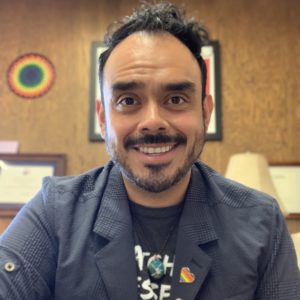 I am Joseph (he/him – they/them), child of Yolanda, who enjoys radical laughter with our Creator. Child of George, who creates intimate, rooted music alongside our Creator. I have her curiosity & wild sense of humor and his insatiable desire to connect and to love always more deeply. They gave me my first and longest family, & they taught me how to form new family and community. I end my emails with, “Blessings & warmth, Rev. Joseph Castañeda Carrera, MPP,” but I never introduce myself this way in-person.
I am Joseph (he/him – they/them), child of Yolanda, who enjoys radical laughter with our Creator. Child of George, who creates intimate, rooted music alongside our Creator. I have her curiosity & wild sense of humor and his insatiable desire to connect and to love always more deeply. They gave me my first and longest family, & they taught me how to form new family and community. I end my emails with, “Blessings & warmth, Rev. Joseph Castañeda Carrera, MPP,” but I never introduce myself this way in-person. 
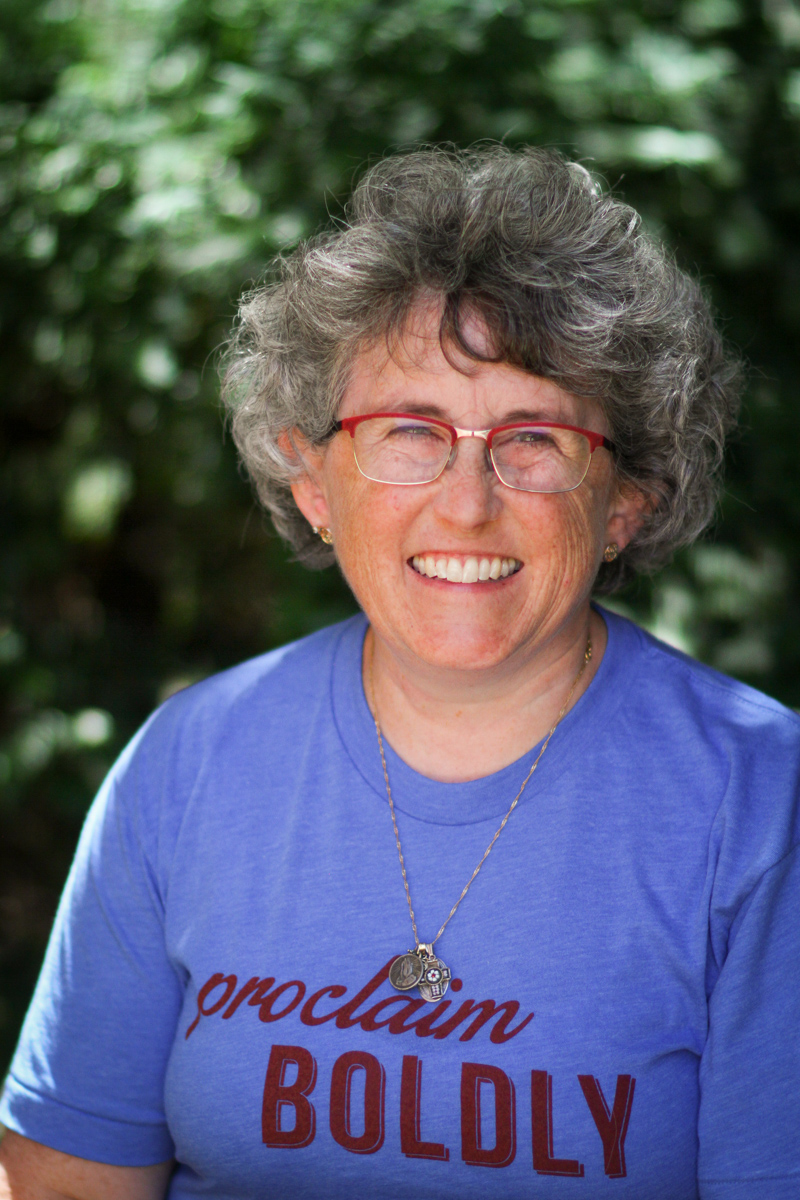
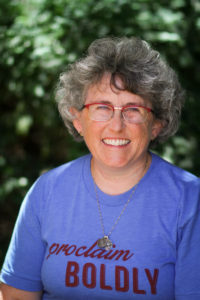 After nine years of working at The Basilica of Saint Mary in Minneapolis, Proclaim member Meagan McLaughlin (she/her/hers) studied at Luther Seminary and United Theological Seminary and graduated with her MDiv in December of 2015. Pastor Meagan was ordained in January of 2020, and is currently serving her first call at Christ Lutheran Church, in Webster Groves, MO. Meagan, her wife, Karen, and their three cats live in St. Louis, and when she is not preaching (on Zoom), providing (socially-distanced) pastoral care, serving on (yet another) committee, or walking in one the parks in her new neighborhood, you can probably find her cuddling with her cats and binge-watching Disney+.
After nine years of working at The Basilica of Saint Mary in Minneapolis, Proclaim member Meagan McLaughlin (she/her/hers) studied at Luther Seminary and United Theological Seminary and graduated with her MDiv in December of 2015. Pastor Meagan was ordained in January of 2020, and is currently serving her first call at Christ Lutheran Church, in Webster Groves, MO. Meagan, her wife, Karen, and their three cats live in St. Louis, and when she is not preaching (on Zoom), providing (socially-distanced) pastoral care, serving on (yet another) committee, or walking in one the parks in her new neighborhood, you can probably find her cuddling with her cats and binge-watching Disney+. 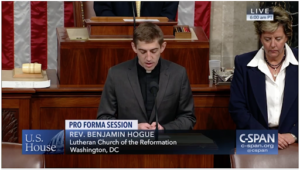 Rev. Ben Hogue was blessed to bring the words of his saint-mentor Joel Workin into the halls of Congress,
Rev. Ben Hogue was blessed to bring the words of his saint-mentor Joel Workin into the halls of Congress, 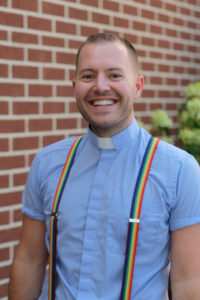 Lewis Eggleston (he/him/his) is the Associate Director of Development and Communications for ELM. He currently lives in Germany with his dog-child and husband awaiting the day he can travel back to visit parents, siblings, and all the nieces and nephews. He is spending his time getting to know his little village and walking the trails around the town castle. Waiting for the day he can be in another musical.
Lewis Eggleston (he/him/his) is the Associate Director of Development and Communications for ELM. He currently lives in Germany with his dog-child and husband awaiting the day he can travel back to visit parents, siblings, and all the nieces and nephews. He is spending his time getting to know his little village and walking the trails around the town castle. Waiting for the day he can be in another musical.  Margarette (she/her/hers) has spent these months during quarantine learning new crochet patterns and moonlighting as a Logistics Specialist for a plant-based meal delivery company. This summer she served as a camp counselor with Queeranteen Camp and participated in a 6-week workshop for queer/trans Iranian-Americans. She will begin her final year of seminary as the Vicar at St. Paul’s Lutheran Church in Oakland, CA. Margarette is a board member of ELM and was part of the planning team for the 30th anniversary of ELM. She lives in Richmond, CA, with her wife, Abby, and their dog Luther. They’re excited to share that they are expecting their first (human) child at the end of this year!
Margarette (she/her/hers) has spent these months during quarantine learning new crochet patterns and moonlighting as a Logistics Specialist for a plant-based meal delivery company. This summer she served as a camp counselor with Queeranteen Camp and participated in a 6-week workshop for queer/trans Iranian-Americans. She will begin her final year of seminary as the Vicar at St. Paul’s Lutheran Church in Oakland, CA. Margarette is a board member of ELM and was part of the planning team for the 30th anniversary of ELM. She lives in Richmond, CA, with her wife, Abby, and their dog Luther. They’re excited to share that they are expecting their first (human) child at the end of this year! 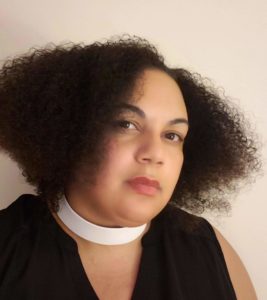 The Rev. Carla Christopher Wilson (she/her) is a redevelopment pastor serving a congregation in Lancaster, PA. Also the co-chair of Lower Susquehanna Synod’s Racial Justice Task Force, Carla is a queer femme Black (and a little Latinx) warrior for self-care and mental health. A former Poet Laureate of York, PA and a published writer, Carla continues to side hustle as a poet until her latest book, Black Catechism, is released later this summer.
The Rev. Carla Christopher Wilson (she/her) is a redevelopment pastor serving a congregation in Lancaster, PA. Also the co-chair of Lower Susquehanna Synod’s Racial Justice Task Force, Carla is a queer femme Black (and a little Latinx) warrior for self-care and mental health. A former Poet Laureate of York, PA and a published writer, Carla continues to side hustle as a poet until her latest book, Black Catechism, is released later this summer..jpg)
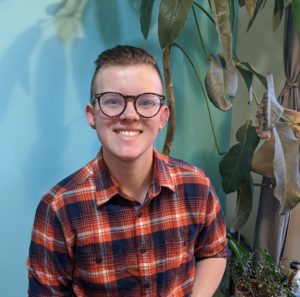
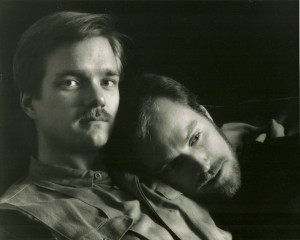
 Kayla Sadowy (she/her) is a bi-vocational seminarian based in Philadelphia. Her work as a music therapist has proven the power of music to be a force for transformation and new life, especially to oppressed people. Kayla’s public witness seeks equity over equality, justice over fairness, and aesthetics over beauty. She loves cooking anything from scratch, hiking with her partner, and experimenting in ever-elusive urban gardening.
Kayla Sadowy (she/her) is a bi-vocational seminarian based in Philadelphia. Her work as a music therapist has proven the power of music to be a force for transformation and new life, especially to oppressed people. Kayla’s public witness seeks equity over equality, justice over fairness, and aesthetics over beauty. She loves cooking anything from scratch, hiking with her partner, and experimenting in ever-elusive urban gardening.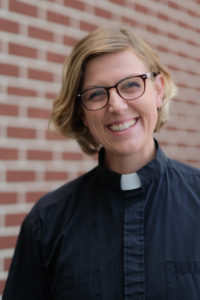 Anna Czarnik-Neimeyer (she/her/hers) is a white anti-racist queer woman seminarian in the ELCA by way of Seattle University (yay Jesuits!) and Luther Seminary (yay Lutherans!). She lives on the unceded land of the Duwamish people of past and present (Seattle). In non-COVID times, she liked thrifting, potlucks, and dress-up dance parties. In COVID-times, she likes cultivating plants, Zoom Church, a home-made mask with her partner’s dog printed on it, and being a cabin counselor for “
Anna Czarnik-Neimeyer (she/her/hers) is a white anti-racist queer woman seminarian in the ELCA by way of Seattle University (yay Jesuits!) and Luther Seminary (yay Lutherans!). She lives on the unceded land of the Duwamish people of past and present (Seattle). In non-COVID times, she liked thrifting, potlucks, and dress-up dance parties. In COVID-times, she likes cultivating plants, Zoom Church, a home-made mask with her partner’s dog printed on it, and being a cabin counselor for “